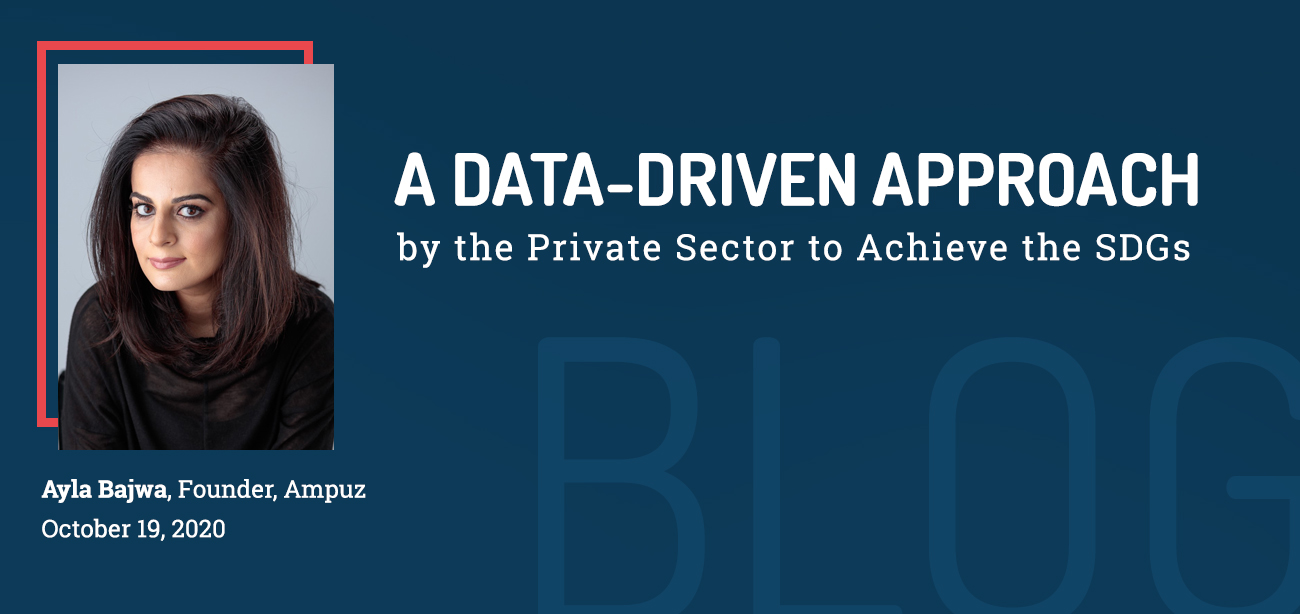
A Data-Driven Approach by the Private Sector to Achieve the SDGs
The Sustainable Development Goals (SDGs) were launched with two striking realizations; firstly that that the private sector must be engaged to achieve them; and secondly, that progress needs to be measurable. Annually, the Secretary General releases an annual report on SDG Progress where it was explicitly stated ‘the availability of timely, disaggregated data across all countries and all targets and indicators to inform the present report remains a challenge. Therefore finding innovative ways to fill these gaps is critical, and leveraging the private sector to do this makes sense.
Globally thousands of annual reports are released, many specifically directed towards an organization’s environmental, social, and governance performance (ESG) frequently following the Global Reporting Initiative standards, the gold standard for ESG reporting. Organizations are also releasing integrated reports and following the Dow Jones Sustainability Index, which provides a ranking for publicly listed companies. All these reports have rich data that could give us a more accurate view of progress being made on some of the SDGs.
However, for these reports to be truly useful there needs to be a shift towards a data-driven approach to public disclosure. As we look forward to the UN World Data Forum (October 19 -21), we are eager to learn more about global case studies in which unofficial private sector partnerships are allowing new data to be generated and considered in the assessment of SDG progress measurement. In the lead up to the 2018 UN World Data Forum, and aligned with Theme 1: New approaches to capacity development for better data we conducted a survey in the UAE to further explore the state of reporting on the SDGs amongst private and semi – private sector players. One of the aims of the survey was to bring the private sector into the fold of the newfound data culture guiding sustainable development work. The intention was that the questions would further coax businesses to consider data when evaluating progress on their sustainability ambitions moving away from an anecdotal and towards a data-driven story telling approach. Survey results were additionally supplemented by interviews and discussions with ampUz partner organizations.
The sample size for the survey was relatively small, with only 70 companies approached. The intention is that the survey will be the first step to a more expansive study. All engaged respondents were from the sustainability functions of their organization.
Through the survey we learned that businesses in the first two years, predominantly emphasized creating awareness for the SDGs. From a reporting perspective, companies made public commitments and highlighted priority SDGs, but beyond that, there was a wide variation, in data-driven public disclosures. Only a small group of businesses considered the SDG global indicator framework when it came to measuring their own progress; this tendency aligning with private sector global trends. However five years later, we find that private sector organizations are collaborating with their stakeholders to identify metrics that consider busines priorities, strengths, and the SDG global indicator framework.
Findings from the Survey:
- 100% of the respondents ranged from being ‘very familiar’ to ‘extremely familiar’ with the SDGs. No one was ‘unfamiliar’ or not at all ‘familiar’. The SDGs were successfully communicated and principally embraced by businesses.
- The SDGs are positioned as an opportunity to innovate and create resilient business models. This theme was highlighted during the Uniting Business Live hosted by the United Nations Global Compact. Nevertheless, in the survey, 0% of respondents agreed with this sentiment; claiming their businesses did not see the SDGs as an opportunity for innovation.
- 77% of the respondents viewed the SDGs as a framework to improve or develop their sustainability strategies.
- 65% of the respondents are evaluating the SDG targets and global indicator framework when creating their own metrics.
- Favoured SDGs for respondents in order were SDG 4 on Quality Education, SDG 5 on Gender Equality, SDG 3 on Good Health and Wellbeing and SDG 13 on Climate Action.
- 90% were open to government level collaboration on reporting.
Recommendations:
- If local level governments establish a formalized approach for civil society and the private sector to input data, the likelihood is that businesses will participate in such a scheme.
- The adoption of technologies capable of collating and analyzing data on the SDGs can support country-level reporting. These technologies can enable alternate data sources; provide a more accurate picture of progress and challenges, and ultimately improve the quality of information available through the annual Voluntary National Review (VNR) process.
- Support businesses that have prioritized certain SDGs and now require associated data points. These data points will need to align with organizational priorities and the SDG global indicator framework. In many cases organizations are not considering the global framework when identifying KPIs, which results in an inability to contribute to country and international level assessments on progress for the SDGs. Most of the respondents expressed that the most difficult challenge is the lack of automation in their sustainability and SDG implementation plans. This once again presents an opportunity for technology solutions that could streamline such processes.
- On a country or regional level, there could be consideration given to the creation of data points for popular SDGs, which all businesses could then report. These data points should be created in consensus and be aligned with the SDG global indicator framework.
Ultimately through strategic private public sector partnerships we could gain a more accurate picture on progress while elevating the state of private sector reporting on the SDGs. Technology and an openness to enhanced accountability will be integral to actualizing this. We are excited to join the UN World Data Forum and explore these phenomena further.
